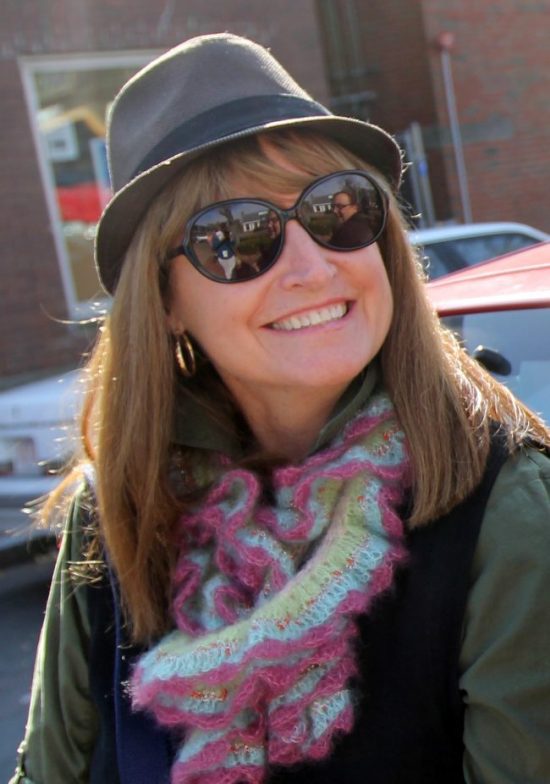“I’ve never really had any insecurity or doubt about who I am or what I’ve contributed, or the recognition I deserve…I mean, I’m a DJ in the Rock n Roll Hall of Fame and you don't get put in there if you suck."
The DJ is Meg Griffin, and for the legions of Family Guy fans who only know her namesake from the show, she’s not impressed with the character her once family friend Seth McFarland created. “I think the reason he did that with my name, because I do think he’s really snarky, was because I am the only one in the family that had some level of fame…with the radio.”
Meg Griffin’s career in radio can be described as nothing less than legendary. She’s the subject of a new documentary called “I Am What I Play” that highlights the careers of four of the country’s most influential rock DJ’s and the trendsetting impact they've held in the evolving world of rock music. She was the first DJ to play punk music in New York, ushered in new wave, and helped launch the careers of artists like Patti Smith, the New York Dolls and the Sex Pistols. She’s worked alongside Howard Stern, and interviewed what might quite possibly be the most impressive list of rock legends; Robert Plant, Ryan Adams, Elvis Costello, Tom Petty, Gregg Allman, and Roger Daltry are just the tip of the iceberg. She’s seen it all, lived a rock n’ roll life, and at age sixty-two, is still doing it. She’s the host of Meg Griffin’s Disorder, a radio show on Sirius’ The Loft Channel that once you get to know Meg is unsurprisingly “free form” radio, a format that she’s championed since she began her career in 1975. She always played what she wants to play, made a legendary career out of it, and still does it everyday.
At this point, having an almost forty-year career in the radio business comes with its perks. Griffin currently conducts her radio shows from the comforts of her home here in Massachusetts, which gave me the opportunity to meet and discuss her storied career in the flesh. We met at a local recording studio in Gloucester, where she had just finished up an interview with local saxophone extraordinaire Henley Douglas, who is somewhat of an unknown legend in his own right. Henley’s local notoriety is proportionate to Griffin’s nationally, but their appreciation of each other is mutual and immediately noticeable.
“I usually replay my interviews three or four times and its also OnDemand, so you’ll get to hear it” she assures Douglas before leaving the studio.
Douglas, known simply as Henley on the North Shore of Massachusetts, has made a living as a musician but most likely never made a connection with the kind of clout that Griffin holds. Upon leaving she promises to promote his next gig at a barbecue festival, proving no matter where she lives, she always supports the local music scene, along with all the musicians and people that make it happen.
At her suggestion I hop into her truck and we head to a local sushi restaurant where she eagerly and candidly begins discussing her career. In particular, her friendship and history with Howard Stern, whose playful badgering of Griffin’s relentless passion for music and openness in describing just how inept of a DJ he was back then, first convinced me to turn the dial to the Loft.
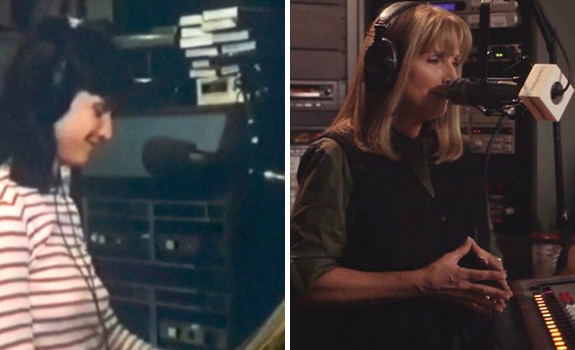
Meg Griffin at WRNW FM in NYC circa 1980 and at SiriusXM studios.
“I think people would be surprised to hear just about how conservative he was... at least musically. We did know more about music than him but the only thing I’ll say about that is… well, look, it’s all to make an interesting radio show…but he’ll sometimes say we acted really snotty about it and no, not at all. In fact at the time, I was the music director and I kept trying to give him new music to play. One time I gave him the Elvis Costello single, it was the ballad, early Elvis Costello, the song called ‘Allison,’ -it was an import, 45, with album art that had a picture of a woman, that was supposed to be the Allison in the song in a frame, and the glass is cracked. It was just art ya’know, and I just remember giving that to Howard and his response was like ‘-oh no, I couldn't play this’-I’m just trying to figure this guy out. You work at a rock n’ roll station, this is a ballad, what’s the problem ya’ know?- But nobody was picking on him there.”
She went on to describe how she had been able to see Stern evolve over the course of his early career into the shock jock and self-proclaimed King of All Media he is known as today.
“If there was this wilder side to his personality back then, it wasn't apparent yet. That came out later, he just realized, as he shows in that film, if he didn't do something drastic to get attention then what was he doing it for… because he didn't really get into to be a DJ. I think he slowly discovered that he got into it to be the main personality of the show as opposed to playing records.”
Playing records was exactly what Griffin was in it for however. From her first job in radio 1975 at that small house in the woods up in WRNR in Briarcliff Manor, New York where Griffin worked alongside Stern, she began playing records from artists coming out of the the emerging New York Punk scene.
“We were mostly playing like the Beatles and Allman Brothers, and Fleetwood Mac and Steely Dan, and I was kind of getting bored with a lot of it, not all of it, but some of it was getting really overproduced…then this punk thing started to happen. It was actually a little bit before I started to work there but I kept going to see it all and to me it was just bringing everything back to the essence of rock n’ roll. I think that’s what the Ramones did when they first came along. Ya’ know when they first came out people thought they sounded outrageous. Now they might sound like a good pop band, but yeah, the (New York) Dolls, and the Sex Pistols and the attitude and to me it was like ‘this is rock n’ roll man, that’s what the attitude is’… ‘it’s supposed to be rebellious’ so yeah radio stations didn't quite get it and I was playing it, but I was mixing it in, making sure every other record was something you’d know.”
“Ya’ know there’s a way to go from the Ramones to the Beatles, there's a way to go to Patti Smith the Rolling Stones, bring in what they know and give them something new and keep that balance going. There were a few places where I took shit or was put in the doghouse or told to play a little less of it until finally they started to realize that my show was creating press for them. People were writing about it because it was new and different and all the New York papers knew about me and wrote about me and then the stations started to like it.”
Eventually Griffin built up enough notoriety to land a job at the famed WNEW FM in New York, a station as Griffin puts it “was a gig everyone wanted. It was free form and it was New York City. It was a really well known, well established radio station.” There while hosting weekend shows she received what some might call the opportunity of a life-time, the chance to be one of the original MTV VJ’s.
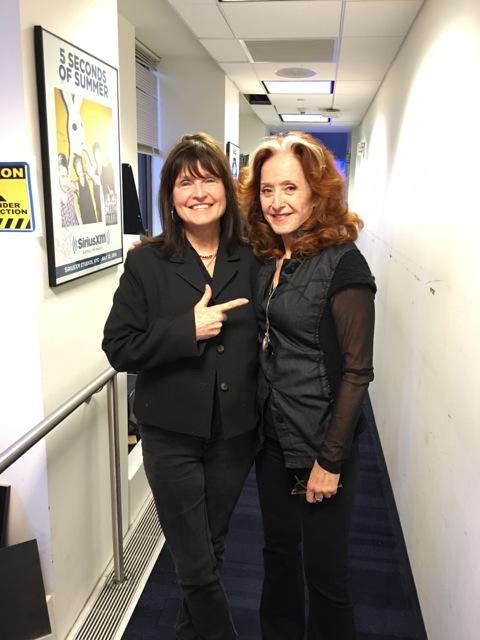
Griffin with friend and fellow Rock N Roll Hall of Famer Bonnie Raitt
“Everyone I know was going in for the auditions. They were holding a million auditions. They were thinking they would mostly audition DJ’s because they were thinking it would just be a natural thing for a DJ to be a VJ and that’s not true because not everyone’s good on camera ya know? Some people are really stiff on camera. I was married at the time, Joe and I went in, he was also a DJ, we ran a couple stations together. We went in. He really wanted to go in because everyone was auditioning and thought we’d be really foolish not to but I really didn’t give a shit and there were like three videos in existence at the time, so I was like ‘-what are we gonna play, there’s only like three videos.’ They weren’t really ready yet; they had to catch up with producing these things. But I said I’ll go with ya, and Joe and I went in and he’s a very funny man, and I can be pretty funny and I think everyone that went in for the audition were all taking it pretty seriously and Joe and I were like goofy and playful and I don’t remember what I said but they loved us.”
Griffin and her then-husband were not offered the job as a duo however. It was Meg who was being courted to fill a very typecast role as the “tomboy” music geek for the original music television network.
“I’m sitting in the office and it’s the day I’m supposed to sign the contract. I was already feeling a little funny about it, but I didn't know what it was, nobody knew what it really was, and I knew I loved radio…I was the last one to say yes, so they had already hired Nina [Blackwood]. They had already hired Mark [Goodman]. They had already hired Allen Hunter. They had already hired the late J.J. Jackson. And then me. And I hear Bob (Pittman, the mastermind of MTV and current CEO of I <3 Radio) on the phone and he says ‘So I got my sex bomb’…that was Nina, ‘I got my black’…that was J.J, ‘I got my Jew,’ which was Mark Goodman, ‘I got my WASP,’ which was Allen Hunter and ‘I’ve got my tomboy,’ which was me, Meg Griffin. And I was in the room next door and I heard it.
“Then he calls me into his office not knowing that I heard it, and he said ‘there's only one issue with you.’ I thought well I’ve got more than a few with you, but he said ‘you’ll have to quit radio.’ And I was only doing weekend shows at the time at WNEW so I said my weekend work would not interfere. But he said ‘no it's gotta go.’ It was a childhood dream of mine to work at WNEW FM. His reply was that ‘well if you only have the MTV job and nothing else to fall back on you’ll work harder for me out of fear, that if you didn’t have this job you’ll have nothing.’ And I thought ‘well I didn't get into rock n roll to feel fear.’ It was just rubbing me the wrong way. I didn’t say anything to him about what I had just heard, but yeah I turned it down.”
Even though the typecasting of MTV didn’t sit well with Griffin, her extreme passion for music and tomboy perception perhaps unknowingly helped her navigate the waters of a male dominated industry. I shared with Griffin some recent stories that have come to light about how sexual harassment still been permeates the music industry today. She was appropriately saddended but not surprised.
“It was rampant…I was never inappropriately propositioned or anything like that, either from somebody that I was trying to get a job from, or record label guys or whatever. The way that I feel that I was not treated fairly was that I was consistently paid less and we still are. With that being said I’ve heard horror stories. I think that partly I was never approached in that way was because even if I was- and I’m being very honest in what I’m saying here- it would have gone right over my head. I was such a non-minded- in that way person, especially when I first got in. I was little tomboy whose life was saved by rock n roll, like the Velvet Underground song says. and I just lived for it and it was just all I did. All I did was just buy records and go to clubs.”
Not long after turning down the MTV job, Griffin was made full-time at WNEW and from then on continued to carve out an unparalleled career in rock radio at stations like KROK in New York and WMMR in Philadelphia. It wasn’t until the late nineties and with the ever increasing corporatization of the radio business that Griffin felt the free form liberties she’d grown accustomed to begin to slip away. She escaped what she described as an increasing amount of “noise” from commercial radio and moved onto WFUV, a commercial-free college radio station and NPR affiliate that once boasted a “city-folk” format of eclectic contemporary artists. It was there that a new start-up venture that promised to revolutionize the radio industry began courting her to join their ranks.
Before they had even launched the satellites into space, Sirius Satellite Radio began hiring talent to program and host their long list of planned radio stations. They had hoped to tap Griffin not to host a classic throwback channel devoted to only playing music from a certain genre or era, but one that she could create in the vision she had pursued her entire career; free form radio. In addition to hosting a daily show, however, they wanted Griffin to be the Program Director for the entire channel, a role she didn’t quite feel so comfortable with at first.
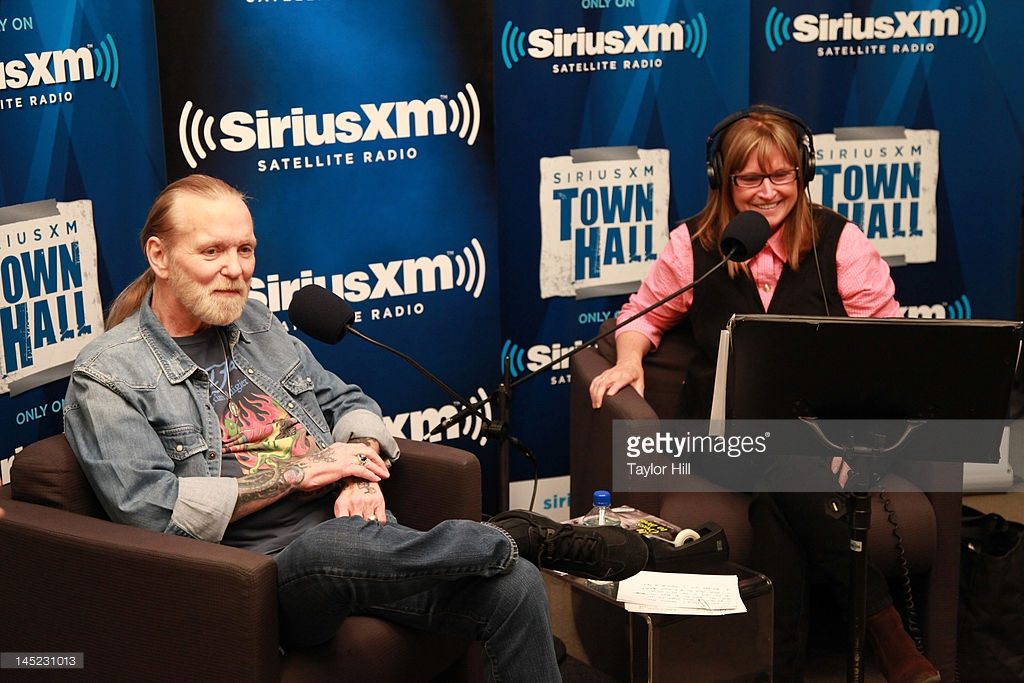
Griffen with Gregg Allman Generated by IJG JPEG Library
“I was really challenged, because I had never really been the equivalent to a Program Director before. I had been a Music Director, but Program Director is different because it's really having to have the overview of the whole personality of what your radio station is. It’s hiring all your jocks, it’s doing a lot of interviews, your own shows everyday, it's a lot. I decided to take the job because it made me a little nervous. and I thought after all these years in radio, if you're being offered something that's making you nervous then you ought to do it, because you can sit back on what you have, but I always like to push it to where I'm not comfortable and see if I can do it.”
Sixteen years later, Sirius is the longest continuous stint Griffin has held in radio, and even though she’s resorted back to the singular role of on-air talent, Griffin's passion for music and radio hasn’t waned a bit. If you listen to her show now, you’ll hear that she still champions newer artists and works them into mixes in the same way she's always done it. I recently caught her playing two new cuts within an hour from local blues and soul singer Julie Rhodes sandwiched in between a track from the new Peter Wolf record and a debut track from indie artist The Fantastic Negrito.
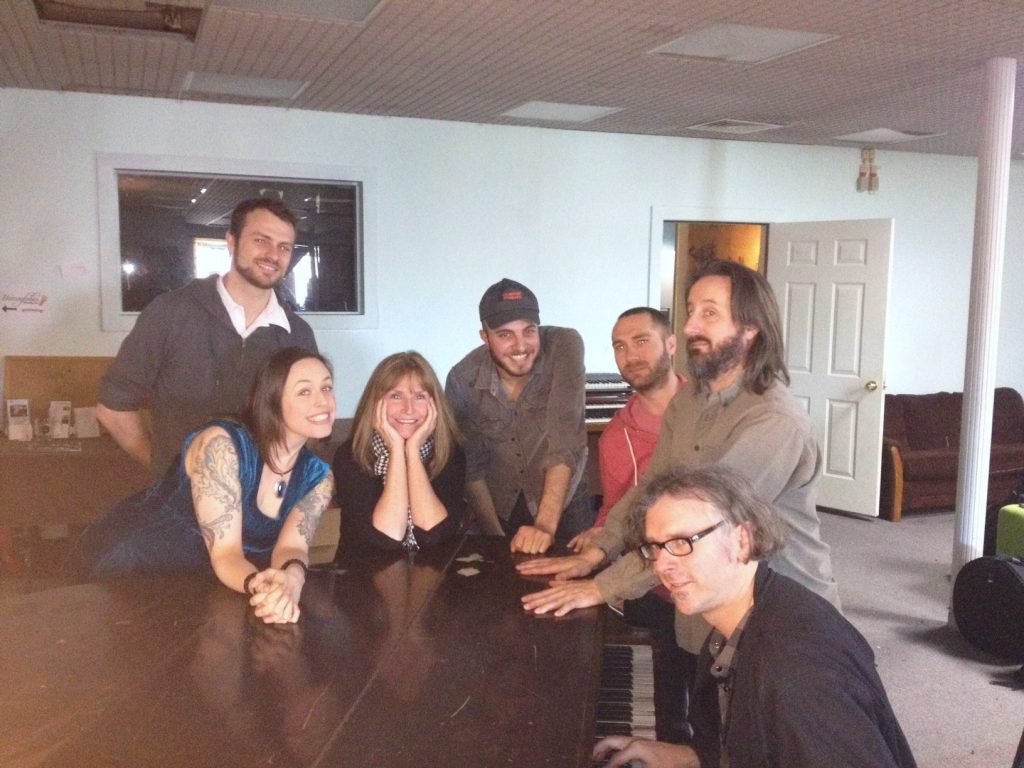
Griffin with indie-folk band Kingsley Flood (Photo by Mike Marrone)
Her passion for championing veteran artists who she feels never got their dues also emerges once a year when she brings a laundry list of artists to The Rock and Roll Hall of Fame committee meetings where she lobby's for artists she feels have had a profound influence on the history of rock n roll. Her first year on the committee in 2013 she was able to persuade the board to induct legendary blues guitarist Albert King.
The Rock and Roll Hall of Fame also honored Griffin as one of the greatest on-air rock radio personalities in a museum exhibit showcasing the role radio has played in the history of the genre and the people whose musical curation made it happen.
Perhaps most importantly, in an age when people discover music and share media content in a plethora of new ways, her passion for the radio medium has been unwavering. She still thinks of it, much in the same way she thinks of the late David Bowie, as a friend who is always there: “the radio was really like your friend. It keeps you company, and keeps people who are feeling alone, feeling less alone… in a pretty tough world.”
Meg Griffin can be heard daily on SiriusXM's The Loft Channel 30

